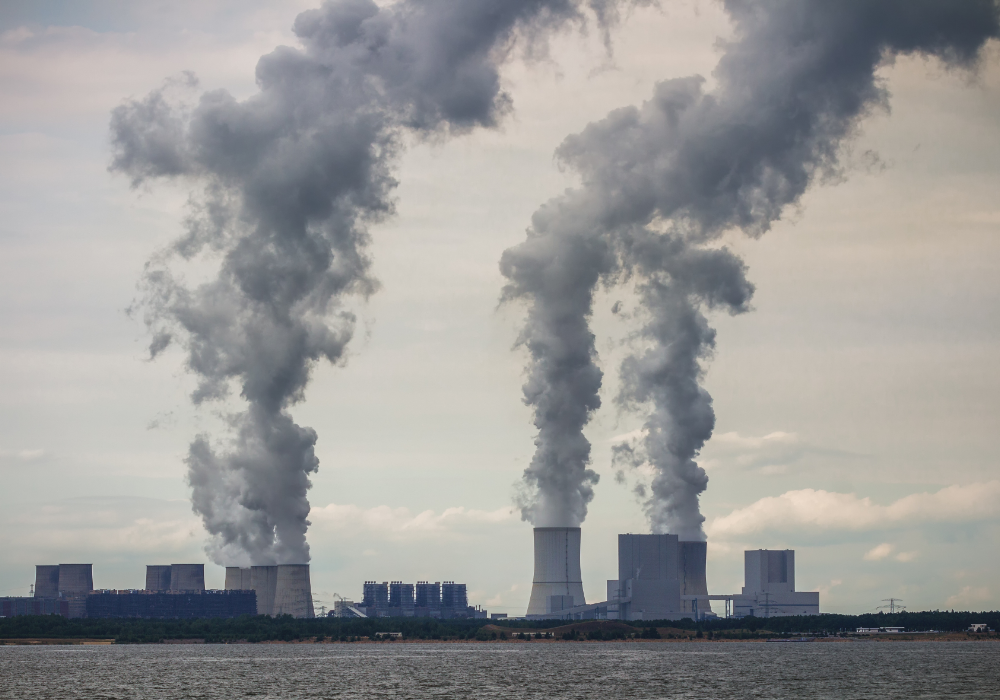When doomscrolling isn’t enough, these are the actions that truly matter.

The climate crisis is here, and it’s not waiting for us to finish our morning coffee. Every week brings new headlines about melting ice caps, wildfires, and record-breaking heatwaves. Meanwhile, we’re told to solve it by using metal straws and carrying tote bags. It’s enough to make anyone wonder, Is anything I do actually making a difference?
Here’s the truth: small lifestyle changes are great, but real climate action means going bigger. The biggest polluters aren’t individuals—they’re industries, corporations, and policies that keep fossil fuels at the center of everything. That’s where the real fight is.
If you’re exhausted from trying to be the perfect eco-friendly citizen while oil companies wreck the planet, you’re not alone. But there are steps that matter—actions that push for real change instead of just making you feel better. Whether you’re a climate newbie or a seasoned activist, here are 13 ways to fight back in a way that actually counts.
1. Forget the plastic straw guilt—fossil fuels are the real enemy.

Yes, reducing waste is great, but if you’re obsessing over plastic utensils while ignoring fossil fuels, you’re missing the point. The real climate villain isn’t your takeout container—it’s the industries that pump billions of tons of carbon into the air every year. Plastic pollution is a serious issue, but even if we eliminated all plastic waste tomorrow, fossil fuel emissions would still be driving the planet toward disaster.
According to the U.S. Environmental Protection Agency (EPA), electricity and heat production accounted for 34% of global greenhouse gas emissions in 2019, primarily due to burning coal, natural gas, and oil. Instead of sweating the small stuff, focus on cutting fossil fuel reliance where it counts. Walk or bike when possible, switch to an electric appliance over gas, and most importantly, support policies and organizations that are actively working to dismantle the fossil fuel empire.
2. Cut back on meat and dairy, because factory farms are environmental disasters.

You don’t have to go full vegan to make an impact, but cutting back on meat—especially beef—can dramatically shrink your carbon footprint. As highlighted by Richard Waite for the World Resources Institute, beef production requires 20 times more land and emits 20 times more greenhouse gases per gram of protein than plant-based proteins like beans. Industrial animal agriculture is a nightmare for the planet, responsible for deforestation, methane emissions, and water pollution.
Support local and regenerative farms when you do buy animal products. Industrial-scale meat production isn’t just bad for the climate—it’s also harmful to workers, local ecosystems, and food security. The less we depend on factory-farmed meat, the faster we can transition to more sustainable food systems. Eating plant-based isn’t about sacrifice; it’s about making choices that align with a healthier future for the planet.
3. Stop giving your money to banks that fund climate destruction.

Think your bank is just holding onto your hard-earned cash? Think again. Major banks are pouring billions into fossil fuel projects, quietly funding the very industries driving climate change. Per Fossil Free Funds, the Banking on Climate Chaos 2024 report found that the world’s 60 largest banks have funneled $6.9 trillion into fossil fuels since the Paris Agreement.
The worst offenders include JPMorgan Chase, Citibank, Wells Fargo, and Bank of America, all of which have invested heavily in fossil fuel expansion. Divesting from these banks and switching to ethical, fossil-free financial institutions is one of the most powerful personal actions you can take. The same goes for where you shop—support brands that prioritize sustainability and cut ties with companies bankrolling environmental destruction.
Money talks, and when enough people move theirs in the right direction, corporations and banks have to listen. Plus, there’s nothing quite like the satisfaction of knowing your savings aren’t funding oil spills.
4. Vote like the planet depends on it, because it actually does.

You can swap every burger for tofu and never take another flight, but if the people in power keep subsidizing oil companies and blocking renewable energy policies, none of it will matter. Personal action is great, but large-scale policy shifts are what actually move the needle. The fossil fuel industry has spent decades lobbying politicians to stall climate progress—it’s time we make our voices louder than theirs.
Research climate policies in local, state, and national elections, and vote for leaders who will push for real action. Don’t stop there—call, email, and show up to demand policies that phase out fossil fuels, fund renewables, and hold polluters accountable. Politicians cater to the loudest voices, so let’s make sure ours are louder than the lobbyists. It’s easy to feel powerless, but political engagement is where real climate wins happen.
5. Fly less, because planes are carbon-spewing machines.

Hopping on a plane for every weekend getaway adds up fast. Air travel is one of the biggest carbon culprits, and while skipping a single flight won’t fix everything, frequent flyers have an outsized impact. If you’re jet-setting multiple times a year, rethinking how you travel can be one of the biggest climate moves you make.
A single round-trip flight from New York to London emits as much CO2 as some people generate in an entire year. Opt for trains, buses, or road trips when you can, and when flying is necessary, choose direct flights (which burn less fuel). Carbon offsets are an option, but they’re not a get-out-of-jail-free card—advocating for stronger airline regulations and pushing for better rail infrastructure is where real change happens. Until that day, maybe reconsider that quick trip to Cabo. Reducing unnecessary flights is one of the most effective ways to lower your personal carbon footprint without much effort.
6. Your power bill is funding fossil fuels, but switching to clean energy can change that.

Every time a light switch flips or a phone charges, fossil fuels might be behind it. Many power grids still rely on coal, oil, and gas, keeping dirty energy in business while driving up emissions. Fossil fuel companies profit from these outdated systems while customers unknowingly fund climate destruction. The good news? There’s a way out. Many energy providers offer renewable energy options, allowing customers to switch to wind or solar power for an extra fee. Homeowners can install solar panels for long-term savings while reducing dependence on fossil fuels.
Even simple changes like upgrading to LED bulbs, using energy-efficient appliances, and adjusting thermostats cut down on waste. The more households transition to clean energy, the faster fossil fuels lose their grip on the market. Investing in renewables isn’t just about sustainability—it’s about shifting the balance of power away from polluters and toward a cleaner future.
7. Overconsumption is destroying the planet, and fast fashion is one of the worst offenders.

Fast fashion fuels a cycle of waste, pollution, and exploitation. Factories produce cheap clothing at an alarming rate, using massive amounts of water, chemicals, and fossil fuels. These trendy items wear out quickly, get discarded, and pile up in landfills, creating an environmental disaster. Overproduction is driven by consumer demand, but companies encourage it with constant sales and disposable trends.
Breaking the cycle means buying less and buying smarter. Choosing high-quality, timeless pieces and shopping secondhand reduce waste and slow down the demand for mass production. Supporting brands that prioritize ethical labor practices and sustainable materials shifts the industry toward responsible manufacturing.
Repairing and repurposing clothing extends its life, keeping fabric out of landfills. Small changes in shopping habits send a clear message: endless consumption isn’t sustainable, and the planet can’t afford to keep up with the pace of throwaway culture.
8. Corporations produce the majority of emissions, and they must be held accountable.

For years, companies have blamed individuals for the climate crisis while continuing to pollute on an unimaginable scale. The world’s top polluters release billions of tons of carbon every year, making personal lifestyle changes feel insignificant in comparison. While people are encouraged to recycle and cut back on meat, industries operate with little regulation and endless loopholes.
Supporting businesses with real sustainability commitments and rejecting corporate greenwashing forces industries to take responsibility. Public pressure works—when consumers demand transparency, companies respond. Holding major brands accountable through boycotts, petitions, and direct advocacy pushes them toward cleaner operations.
Governments must also be pressured to enforce stricter regulations on emissions, waste, and unethical practices. Climate solutions must focus on systemic change, not just personal choices. The less power corporations have to dictate environmental policies, the more progress can be made toward real climate action.
9. Climate activism creates real change, and there are ways to get involved.

Major climate victories—like air quality regulations and protected wildlife areas—didn’t happen because corporations or governments decided to be responsible. They happened because people fought for them. Activists have always been at the center of environmental progress, applying pressure in ways that force real action.
The fight isn’t just about marching in the streets; it’s about making demands where they matter most. There are many ways to get involved. Supporting climate organizations, signing petitions, and donating to legal efforts that hold polluters accountable all make a difference. Local activism, such as attending city meetings to oppose environmentally harmful projects, influences change in communities. Educating others and spreading awareness through social media or conversations helps normalize climate action. Every movement needs numbers, and the louder the voices demanding action, the harder it becomes for leaders to ignore them. The people who push for change are the ones who make it happen.
10. Natural ecosystems absorb carbon, and protecting them is essential for the climate.

Forests, wetlands, and grasslands are the planet’s natural defense against climate change. They store carbon, regulate weather patterns, and support biodiversity. But instead of protecting these ecosystems, industries clear them for agriculture, urban expansion, and mining. Destroying them doesn’t just eliminate their ability to absorb carbon—it actively releases stored carbon into the atmosphere.
Preserving natural landscapes is one of the most effective ways to combat climate change. Supporting conservation organizations, reforestation projects, and Indigenous land protection helps restore ecosystems. Planting trees, avoiding products linked to deforestation, and advocating for stronger environmental protections ensure that nature can keep doing its job.
Every acre of land saved from destruction slows climate change. Nature has always worked to stabilize the planet, but it can’t do it alone. The more people fight for protected lands and stronger conservation laws, the better chance there is for a livable future.
11. Wasting energy increases emissions, and making homes more efficient reduces the problem.

Leaving lights on, overusing heating and cooling, and running inefficient appliances waste electricity and fuel. These small inefficiencies may seem harmless, but they add up. The more energy wasted, the more demand there is for fossil fuels. Coal and gas plants work overtime to power homes and businesses, making energy efficiency a key part of reducing emissions.
Switching to LED bulbs, insulating homes properly, and upgrading to energy-efficient appliances significantly cut down on waste. Installing smart thermostats, using cold water for laundry, and air-drying clothes also reduce unnecessary energy use. The less electricity that needs to be generated, the fewer emissions enter the atmosphere. Lower energy consumption saves money, decreases reliance on fossil fuels, and reduces the overall strain on the power grid. Even minor adjustments at home make a meaningful impact when adopted on a large scale.
12. Talking about climate change makes a difference, and silence helps no one.

Too many people avoid climate discussions because they feel overwhelming, divisive, or unimportant. Avoiding the conversation only allows misinformation and inaction to continue. Climate change denial thrives when people assume the problem is too big to solve or that their voice doesn’t matter. Normalizing climate conversations makes it clear that inaction is unacceptable. Bringing up climate issues with friends, family, and coworkers helps shift public perception. Sharing reliable information, challenging myths, and amplifying the urgency of the crisis create awareness that leads to change.
Climate solutions require widespread public support, and conversations help build that support. The more people talk about the problem, the harder it becomes for leaders to ignore it. Conversations lead to action, and action leads to results. Silence only benefits those who want the status quo to continue.
13. Giving up isn’t an option, because there is still time to make a difference.

Every year brings more climate disasters, policy failures, and corporate irresponsibility, making it easy to feel hopeless. But despite the setbacks, progress is happening. Renewable energy is expanding, fossil fuel plants are shutting down, and environmental movements are growing. The fight is long, but history proves that determined action leads to real results.
Every effort counts. Voting for climate-conscious leaders, reducing waste, and holding corporations accountable all contribute to progress. No single person can solve the climate crisis, but collective action creates real impact. Change happens when people refuse to accept inaction. Keeping the momentum alive, even when progress seems slow, is what moves the needle forward. The future is still being shaped, and every decision matters. There’s still time to fight for a livable planet, but giving up ensures failure. Action—at any level—is the only way forward.